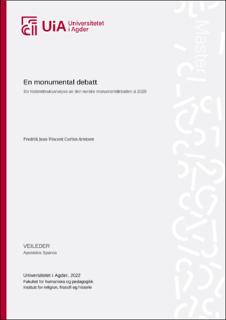| dc.description.abstract | Abstract
There was a widespread debate thoughout the western world that treated public monuments and Norway was among one of those contries. The three most debated cases in this debate was tied to the monuments representing Winston Churchill, Ludvig Holberg and Carl von Linné. All three had different accusations: Churchill was accused of being racist and being a personification over the british colonialism and imperialism, Holberg was primarily accused of having economic interests in the Danish-Norwegian slave trade and Linné was seen as a founder of modern racism on the basis of his work in human systematics with hierarchical undertones. The main aim of this thesis is to show how arguments of historical nature was used in the norwegian monument debate of 2020 as rhetorical devices. I will do so by implementing theories of use of history.
By analyzing the relevany evidence I have been able to identify a set of arguments of historical nature used in this debate. I seprated the arguments under two types of arguments. Historical arguments that tries to clarify a historical events, and in this debate the arguments under this category is tied to racism, colonialism and imperialism. I called the second category metahistorical arguments and argues how historical events should influence and interact the present time. The metahistorical arguments i identified in this debate was that the person in question was a child of his/her time, that the monuments is alienating, that we should focus on why we hounour these figures, that we should learn of history, that we could forget our history, that the debate was imported from the US, culture war argument and ad-hominem and slippery slope argumentation.
Furthermore I have been able to terminate how different participants of the debate diffently argues, based of political affiliation or profession, as well as how the debate and the arguments used can be seen under the theories of use of history with the different typologies used.
This project is, by my knowledge, a first of its kind and therfore my research had no foundation to work on and made the work demanding, but important, and hopefully the findings of it may lay a groundwork for further research on this kind of topic. | |
